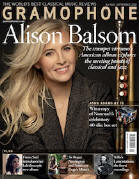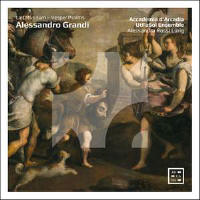Texte paru dans: / Appeared in: |
|
|
Outil de traduction |
|
|
Alessandro Grandi – pushed into a distant second place (and quite possibly out of St Mark’s in Venice altogether) by Monteverdi – has never quite recovered the status that once saw him hailed as ‘the greatest motet composer of his time’ and an equal to his older rival. Nevertheless, Grandi’s prolific output is well preserved, and his 15 volumes of sacred music (including no fewer than 11 volumes of motets alone) are reasonably well served on disc. But if there is a gap, Rodolfo Baroncini’s booklet notes for the new recording from Accademia d’Arcadia and the UtFaSol Ensemble argue, it’s the psalms – ‘perhaps the least known’ of Grandi’s music. This recording goes a long way towards filling it, with a deft selection that takes in plenty of the smaller works typical of Grandi’s intimate style – the three-voice Beatus vir, Laudate pueri and Confitebor settings – as well as the larger-scale outliers, including the glorious opening Magnificat a 10 and the unexpectedly delicate nine-voice Laetatus sum. Having the zesty sackbuts and cornetts of the UtFaSol Ensemble helps amplify the range, underpinning the polychoral drama of the Magnificat (probably composed for the Feast of the Assumption). Director Alessandra Rossi Lürig drives her forces hard, sustaining tension and urgency in the face of the text’s highly contrasting episodes. The Dixit Dominus is cut from the same cloth, but here we find more light and shade: a tender soprano solo verse at ‘Virgam virtutis’ shadowed by a wiry violin; a lyrical tenor passage at ‘Juravit Dominus’; some wonderfully pompous brass at ‘conquassabit’. But with such well-trodden texts, it’s hard to suppress instinctive comparison with better-known settings by Monteverdi or Giovanni Gabrieli, more often than not to Grandi’s detriment. His efficient psalms supply plenty of textural variation and newer concertante elements are fluidly incorporated into the polychoral settings, but there’s little that stands apart. Lürig’s singers tend to sound slightly nasal (particularly among the tenors) but it’s a bright, buzzy, Italianate sound that’s entirely in sympathy with the repertoire.
|
|




